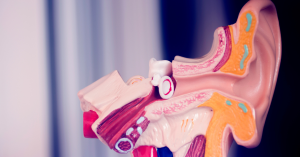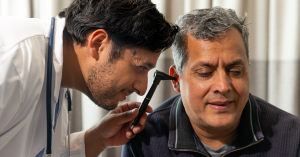If you’ve recently noticed that sounds seem muffled or that you’re having trouble hearing people clearly, you’re not alone. Many adults—particularly those over 50—experience changes in their hearing that can be frustrating and, at times, worrying. Whether the change comes on suddenly or progresses over time, barely being able to hear can affect how you communicate, socialize, and engage with the world around you.
Faint or muffled hearing isn’t always a sign of something serious, but it’s never something to ignore. It could be as simple as earwax buildup or a temporary infection, or it could point to more complex issues like sensorineural hearing loss or age-related decline. The good news is that in many cases, there are effective treatments or solutions that can help restore clarity and improve quality of life.
In this article, we’ll explore the common causes of muffled or faint hearing, how to recognize when it’s time to seek medical help, and what steps can be taken to diagnose and treat the problem. Whether you’re dealing with your own hearing difficulties or caring for someone who is, understanding the “why” behind hearing changes is the first step toward better ear health.
Common Causes of Muffled or Faint Hearing
Hearing that seems muffled or faint can feel like you’re listening through a fog. Voices may sound distant, music may lose its sharpness, and conversations become more challenging—especially in noisy environments. Fortunately, many causes of this type of hearing loss are well understood and treatable. Let’s explore the most common ones.
Earwax Buildup
One of the simplest and most common reasons for muffled hearing is a buildup of earwax (cerumen). While earwax is a natural substance that helps protect your ears, too much of it can block the ear canal and prevent sound from reaching the eardrum properly. This blockage can happen gradually, leading to a slow decline in hearing clarity, or suddenly if wax shifts due to water exposure or improper cleaning.
Fluid in the Middle Ear
Fluid buildup, often related to colds, allergies, or sinus infections, can also interfere with sound transmission. When the Eustachian tube (which helps equalize pressure) becomes blocked, fluid may accumulate behind the eardrum. This is especially common in children but can also affect adults, particularly those with allergies or frequent upper respiratory infections. The result is a sensation of fullness in the ear and reduced hearing clarity.
Age-Related Hearing Loss (Presbycusis)
As we age, it’s common to experience gradual changes in hearing. Presbycusis, or age-related hearing loss, affects the inner ear and typically impacts both ears equally. It usually starts with difficulty hearing higher frequencies, such as women’s and children’s voices or certain consonants in speech. Over time, this can make all sounds seem less crisp or more muted.
Noise-Induced Hearing Loss
Long-term exposure to loud environments—such as working in construction, attending concerts, or using headphones at high volume—can damage the delicate hair cells in the inner ear. This damage accumulates over time, leading to permanent hearing loss. Early signs often include a sense of muffled hearing after loud events, which may become permanent if exposure continues without protection.
Ear Infections and Inflammation
Acute or chronic ear infections can lead to inflammation and fluid in the ear, which temporarily interferes with hearing. These infections can affect the outer, middle, or inner ear and may be accompanied by pain, drainage, or fever. Left untreated, repeated infections can lead to long-term hearing issues.
Otosclerosis
This lesser-known condition involves abnormal bone growth in the middle ear, which can prevent the tiny bones from vibrating properly. Otosclerosis often runs in families and typically presents in young adulthood, but its effects may not be noticed until later in life. The result is gradual hearing loss, often in one ear more than the other.
When Muffled Hearing Is a Medical Emergency
While many causes of muffled or faint hearing are minor and treatable, there are situations where this symptom could be a sign of a serious medical issue—especially if the hearing loss happens suddenly or is accompanied by other symptoms. Recognizing these warning signs can be crucial for protecting your long-term hearing health.
Sudden Sensorineural Hearing Loss (SSHL)
One of the most urgent conditions to be aware of is Sudden Sensorineural Hearing Loss (SSHL), also known as sudden deafness. This condition involves a rapid, unexplained drop in hearing—typically in one ear—that occurs within a 72-hour period. People often describe it as waking up and realizing they can’t hear well in one ear, or as if their ear suddenly “shut off” like a switch.
SSHL is considered a medical emergency, and immediate treatment (usually within 24 to 48 hours) can dramatically improve outcomes. The exact cause is often unknown, but it may be related to viral infections, blood circulation problems, or autoimmune disorders. Treatment typically involves corticosteroids to reduce inflammation and preserve hearing.
Accompanying Symptoms That Raise Red Flags
If muffled hearing is accompanied by ringing in the ears (tinnitus), dizziness or vertigo, ear pain, fluid drainage, or facial weakness, it could signal something more complex:
- Tinnitus and dizziness could suggest inner ear issues like Ménière’s disease or vestibular neuritis.
- Pain and fluid might indicate an acute ear infection or a ruptured eardrum.
- Facial weakness could be linked to neurological conditions like Bell’s palsy, which sometimes affects the facial nerve near the ear.
Any of these combinations warrant a prompt evaluation by a healthcare provider—ideally an audiologist or an ear, nose, and throat (ENT) specialist.
Trauma or Head Injury
If you’ve experienced a recent head injury, even a mild one, and you begin noticing muffled hearing afterward, this could indicate damage to the inner ear or a perilymph fistula (a tear or leak in the inner ear membrane). These situations may also require urgent care to prevent permanent damage.
When in Doubt, Get It Checked Out
The bottom line: if you notice sudden changes in your hearing, especially without a clear cause like earwax or congestion, it’s better to be safe than sorry. Early diagnosis can often mean the difference between temporary and permanent hearing loss.
Diagnostic Steps: How Professionals Identify the Cause
When hearing becomes faint or muffled, especially if the reason isn’t immediately obvious, a professional evaluation is the most reliable way to determine what’s going on. Audiologists and ENT (ear, nose, and throat) specialists use a variety of tools and tests to pinpoint the exact cause and guide treatment.
The Initial Consultation
Your journey typically begins with a detailed medical history and symptom review. Your provider will ask about:
- When you first noticed the hearing changes
- Whether the hearing loss is in one or both ears
- If it came on suddenly or gradually
- Associated symptoms (like pain, ringing, or dizziness)
- Any recent illnesses, noise exposure, or injuries
These questions help narrow down potential causes and shape the next steps.
Physical Examination of the Ear
Next, the clinician will conduct an otoscopic exam, using a small lighted instrument to look inside your ear canal. This can reveal common, visible issues such as:
- Earwax blockage
- Signs of infection (redness, swelling, fluid)
- Eardrum perforation
- Foreign objects in the ear canal
Sometimes, a problem that seems serious can be as simple as compacted wax—easily treatable in a single visit.
Hearing Tests (Audiometry)
If the cause isn’t obvious from the physical exam, you’ll likely be referred for a hearing test. This involves:
- Pure-tone audiometry – You’ll wear headphones and respond to a range of tones to assess the softest sounds you can hear at different pitches.
- Speech recognition testing – You’ll repeat words or sentences to see how well you understand speech in quiet and noisy environments.
These tests measure the degree and type of hearing loss, helping differentiate between conductive hearing loss (problems with the outer or middle ear) and sensorineural hearing loss (issues in the inner ear or nerve pathways).
Tympanometry and Acoustic Reflex Testing
To evaluate middle ear function, your provider may use tympanometry. This test uses gentle pressure changes in the ear canal to assess how well the eardrum moves. It’s especially useful for diagnosing:
- Fluid behind the eardrum
- Eustachian tube dysfunction
- Otosclerosis
Acoustic reflex tests may also be used to check how the ear muscles react to loud sounds, providing further clues about nerve function.
Imaging and Advanced Diagnostics
In some cases—especially with sudden or unexplained hearing loss—imaging tests like MRI or CT scans may be ordered. These help rule out structural problems such as tumors, bone growth abnormalities, or nerve damage.
Why Early Diagnosis Matters
Identifying the cause of faint or muffled hearing as early as possible can lead to better treatment outcomes. Whether the issue is simple (like wax) or complex (like inner ear damage), timely intervention is key to preserving or improving your hearing health.
Treatment Options for Faint or Muffled Hearing
The best treatment for faint or muffled hearing depends entirely on the underlying cause. Some issues can be resolved quickly and easily, while others may require ongoing management or specialized interventions. Below is a breakdown of the most common treatments and what to expect from each.
Earwax Removal
If your hearing loss is due to earwax blockage, the solution may be as simple as professional wax removal. This can be done using:
- Irrigation – Gently flushing the ear with warm water
- Manual removal – Using special tools like a curette under magnification
- Ear drops – Soften wax for easier removal at home (only under guidance)
Avoid using cotton swabs, as they often push wax deeper and worsen the problem.
Treating Infections and Fluid Buildup
For muffled hearing caused by ear infections or fluid in the middle ear, your provider may recommend:
- Antibiotics – For bacterial infections
- Decongestants or antihistamines – If allergies are contributing
- Myringotomy with ear tubes – For chronic fluid buildup, especially in children or recurring cases in adults
Once the infection clears or the fluid drains, hearing typically returns to normal.
Hearing Aids
For sensorineural hearing loss or age-related hearing decline, hearing aids are one of the most effective tools. Modern hearing aids are discreet, comfortable, and programmable to your specific hearing profile. They amplify sounds in the frequencies you struggle with, making speech and ambient noise clearer.
Options include:
- Behind-the-ear (BTE) devices
- In-the-ear (ITE) models
- Receiver-in-canal (RIC) styles
A hearing specialist will help choose the best type based on your needs and lifestyle.
Medical or Surgical Treatments
In some cases, medical or surgical treatments may be necessary:
- Steroids – Used for sudden hearing loss or inner ear inflammation
- Stapedectomy – A surgical procedure for otosclerosis
- Cochlear implants – For severe or profound hearing loss where hearing aids aren’t effective
- Bone-anchored hearing systems (BAHS) – For conductive or mixed hearing loss
These options are typically reserved for more complex or long-term cases and are determined by your hearing specialist after thorough evaluation.
Lifestyle and Communication Strategies
For those adjusting to hearing loss, communication strategies can make a big difference:
- Face people directly during conversation
- Minimize background noise when possible
- Use assistive listening devices (e.g., TV amplifiers or captioning services)
- Let friends and family know about your hearing challenges so they can support you
Many people find these strategies helpful even while waiting for formal treatment or in combination with other interventions.
How to Prevent Hearing Loss or Worsening Symptoms
While some causes of muffled or faint hearing—like age or genetics—can’t be avoided, many others can be prevented or managed with proactive care. Whether you’re trying to protect your current hearing or avoid further decline, there are simple but effective steps you can take.
Protect Your Ears from Loud Noise
Noise exposure is one of the most common and preventable causes of hearing loss. Activities like mowing the lawn, attending concerts, or using power tools can damage your inner ear over time. To protect your hearing:
- Wear earplugs or noise-canceling earmuffs in loud environments
- Keep volume low when using headphones or earbuds
- Follow the 60/60 rule: listen at 60% volume for no more than 60 minutes at a time
- Use smartphone features or apps that monitor and limit sound exposure
Even a single exposure to a very loud noise—like fireworks or gunfire—can cause immediate damage, so consistent protection is key.
Don’t Ignore Early Warning Signs
Hearing loss often happens gradually, and it’s easy to brush off early signs. If you find yourself:
- Asking people to repeat themselves
- Struggling in group conversations
- Turning up the TV or phone louder than usual
…it’s time to get your hearing checked. Early diagnosis can make a big difference in treatment success and quality of life.
Practice Good Ear Hygiene
To prevent earwax buildup and infections:
- Avoid inserting anything into your ear canal (including cotton swabs)
- Use over-the-counter ear drops only with a doctor’s recommendation
- Dry your ears thoroughly after swimming or bathing
- Treat colds, allergies, and sinus infections promptly
These small habits can reduce your risk of temporary hearing issues due to blockages or inflammation.
Schedule Regular Hearing Check-Ups
Just like vision or dental health, hearing deserves regular attention—especially as you age. Adults over 50 should have their hearing tested at least once every 3 years, or more frequently if they notice changes.
A baseline hearing test helps track changes over time and catch problems early. If you use hearing aids or have been treated for ear conditions, follow-up appointments are essential to ensure your hearing is stable and your devices are working well.
Manage Underlying Health Conditions
Conditions like diabetes, high blood pressure, and autoimmune diseases can all affect hearing. Managing these with medication, diet, and regular checkups not only improves your overall health but also reduces your risk of related hearing problems.
Hearing health is deeply connected to your lifestyle and general well-being. By taking preventive steps and staying alert to changes, you can protect your ability to hear clearly for years to come.
Conclusion
Experiencing faint or muffled hearing can be unsettling—but it doesn’t have to be permanent or overwhelming. Whether the cause is something simple like earwax buildup or something more complex like age-related hearing loss, there are many ways to diagnose, treat, and even prevent further decline. The key is not to ignore the symptoms.
Understanding the common causes—from infections to noise exposure—and recognizing when to seek urgent medical care can make a critical difference in your hearing outcomes. Timely intervention often leads to better results, especially in cases of sudden hearing loss. And for those with gradual decline, solutions like hearing aids and communication strategies can dramatically improve day-to-day life.
If you or someone you care for is noticing muffled hearing, take the first step: schedule a hearing check-up. Even small improvements in hearing clarity can bring back confidence, improve relationships, and help you reconnect with the world around you.
FAQ
What causes sudden muffled hearing in one ear?
Sudden muffled hearing in one ear may be caused by earwax buildup, fluid behind the eardrum, or a more serious issue like sudden sensorineural hearing loss (SSHL). SSHL is a medical emergency and requires immediate treatment to prevent permanent damage. If hearing loss comes on quickly and isn’t relieved by yawning, swallowing, or cleaning the ear (safely), see a doctor right away.
Can allergies cause muffled hearing?
Yes, allergies can cause inflammation and congestion that block the Eustachian tubes, leading to fluid buildup behind the eardrum. This can result in a sensation of fullness and muffled hearing. Treating the allergies with antihistamines or decongestants can often relieve the symptoms.
Is muffled hearing always a sign of permanent hearing loss?
Not necessarily. Muffled hearing can be temporary and reversible—especially when caused by earwax, infections, or fluid. However, if left untreated, these issues can lead to more lasting damage. Permanent hearing loss typically stems from nerve damage or long-term exposure to loud sounds.
What home remedies are safe for muffled hearing?
If the cause is minor earwax buildup, over-the-counter ear drops may help soften it. Steam inhalation or warm compresses can help with fluid or sinus-related congestion. However, avoid inserting objects into your ear, and never use remedies if you’re unsure of the cause. If symptoms persist more than a day or two, seek professional evaluation.
When should I see a hearing specialist?
You should see a specialist if muffled hearing lasts longer than a couple of days, comes on suddenly, or is accompanied by pain, dizziness, ringing in the ears, or fluid drainage. Routine hearing checkups are also recommended every few years for adults over 50, even without symptoms.
“This article is for informational purposes only and is not a substitute for professional medical advice, diagnosis, or treatment. If you are concerned about your hearing or ear health, please consult a qualified healthcare provider.






